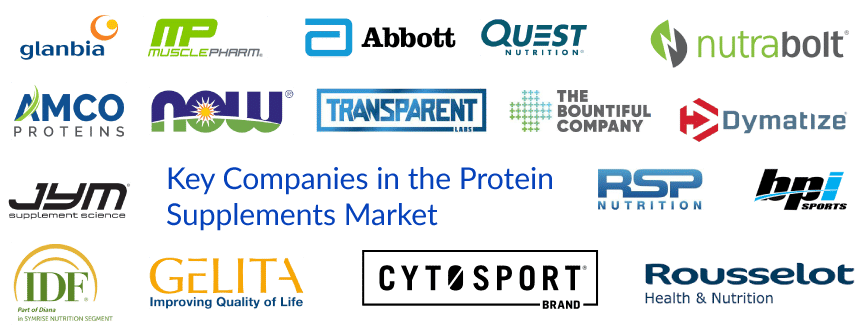How is Protein Supplements Market Evolving with the Ongoing Development?
Feb 22, 2023
Table of Contents
Protein supplements are critical in building and repairing muscles and maintaining their growth. People from specific groups, such as athletes and fitness enthusiasts, rely heavily on essential nutrients to build muscle and recover faster after intense workouts. Moreover, protein supplements are also beneficial for those who are health-conscious since they can help reduce hunger and help preserve muscle mass while dieting. Similarly, the demand is increasing among the older population due to the health benefits of these supplements. As per the estimate, protein supplement sales have grown significantly over the past few decades owing to various favorable factors and growing demand. The demand for Protein supplements is also anticipated to exhibit remarkable growth in the coming years due to the increasing number of fitness enthusiasts and gym fanatics and the changing lifestyles. Currently, the protein supplements market is crowded with several products based on flavor, form, source, and content. Similarly, the market is competitive, with several international and local players catering to the different needs of people across different age groups.
Why are Protein Supplements Important?
Protein supplement demand is growing exponentially due to its wide range of benefits. Protein is an essential macronutrient and is considered the building block of the body. It plays a significant role in maintaining bone and muscle mass and benefits the skin, eyes, nails, hair, etc. They are a convenient and accessible source of essential nutrients and amino acids that can be difficult to obtain from diet alone. Protein supplements also reduce the risk of disease and improve overall health and performance. The deficiency or the low intake of proteins can lead to variations in body structure and movement and can lead to some diseases.
Downloads
Click Here To Get the Article in PDF
Protein Supplements Market Analysis
Today, the protein supplements market is flooded with various types of products based on source, type, and application. Protein supplements are segmented as animal-based (whey, casein, fish, eggs, others), plant-based (soy, rice, pea, spirulina, others), product type (protein powders, protein bars, ready-to-drink, and others). Similarly, as per the application type, they are categorized as sports nutrition and functional foods.
In the product type segment of the protein supplements market, the protein powders category is projected to register significant growth in revenue in the coming years owing to several advantages associated with them. Protein powders have a soft texture, making them easy to package and handy. Moreover, several clinical and commercial developments have been registered in the protein powders segment in recent years, which is anticipated to impact demand and market growth positively. The emergence of new product categories, such as plant-based protein bars and RTD protein drinks, is also getting significant attention among fitness enthusiasts, and the demand for plant-based protein is increasing significantly.
What are the Pros and Cons of Protein Supplements?
Protein supplements are an easy and convenient way to add proteins to the diet. It is in high demand among athletes, bodybuilders, health enthusiasts, and others looking to increase their protein intake and maintain a good physique. Protein supplements boost muscle strength and endurance and make it easier to take on severe activities or reach fitness goals. Similarly, they help in faster recovery after an intense workout and reduce fatigue. Overall, it helps to make it easier to stay active.
However, despite several benefits, there are some drawbacks associated with using protein supplements. A wide variety of protein supplements are available in the market today, and some protein supplements can contain unhealthy additives and chemicals. It is not necessary that protein supplements may contain the same nutrients as natural proteins, as some of them can be processed in a lab. The intake can have some serious impact on health and the body. It becomes necessary to consult the dietician or expert before taking any protein supplement to avoid adverse impacts on health. Similarly, protein supplements are costly and may be out of reach for people from certain income groups for everyday use.
Protein Supplements Market Trends and Dynamics
Various studies and research have shown that across the world, the quantity of protein in regular meals varies significantly and is less than the required amounts. Everyone, irrespective of age and gender, can use protein supplements to fulfill the protein need in the body. They have a high demand among those who are underweight or overweight and those who are dealing with obesity. Rising awareness about a balanced and nutritious diet is one of the key factors driving the demand for Protein Supplements. People facing a deficiency in protein are often recommended to take powders, bars, and ready drinks, among others. Besides rising cases of obesity and malnutrition, the new product launches and regulatory approvals for protein supplements with new developments are further expected to drive the protein supplements market growth.
Recent Developmental Activities in the Protein Supplements Market
The Protein Supplements Market has registered clinical, commercial, and regulatory developmental activities. Some of the major developments in recent years include:
- In December 2022, Merit Functional Foods launched a new standard for transparency and sustainability in the plant protein market with the release of its first USDA Certified Organic protein ingredient, Organic Peazazz C 850. It provides plant-based food and beverage formulators key functional and nutritional benefits, including solubility, viscosity, texture improvement, low sodium, and a minimum of 85% protein.
- In November 2022, Arla Foods Ingredients partnered with British dairy cooperative First Milk to produce a specialist whey protein powder – Nutrilac FO-7875, with a unique ability to increase the protein content of food and drinks to very high levels without sacrificing texture or stability.
- In October 2022, personalized nutrition platform VITL launched a range of targeted vitamin and protein bars, with each one designed to be a supplement to support a person’s well-being and to keep its consumers energized and invigorated. Each low-sugar bar contains 14g of protein packed with vitamins and nutrients like zinc and magnesium and is only 143 calories.
- In September 2022, Arla Foods Ingredients launched a protein bar concept allowing brands to raise the protein content of their protein bars without compromising on size, taste, or texture. The new recipe is based on high-quality whey and milk protein ingredients from Arla’s Lacprodan range. It ensures the rich chocolate mass maintains its flavor and softness throughout its shelf-life, and offers 30% of protein per bar.
Companies in the Protein Supplements Market
Some of the key companies in the protein supplements market include Glanbia plc., MusclePharm, Abbott, Iovate Health Sciences International Inc., QuestNutrition, The Bountiful Company, AMCO Proteins, NOW Foods, Transparent Labs, WOODBOLT DISTRIBUTION LLC, DYMATIZE ENTERPRISES, LLC, Jym-Supplement-Science, RSP Nutrition, BPI SPORTS, International Dehydrated Foods, Inc., Rousselot, GELITA AG, CytoSport, Inc., Hoogwegt, Munk Pack, and others.

Owing to rising demand and high growth prospects, several new players are anticipated to emerge in the Protein Supplements Market. Similarly, due to growing demand, numerous new products will be launched in the market in the coming years.
Protein Supplements Market Future Perspective and Analysis
Protein Supplements have emerged as one of the key products that can address various health needs. The increasing consumer awareness of having a protein-rich diet, the increasing cases of obesity, malnutrition, and others, the growing use of supplements in sports nutrition, and the increasing addition of protein supplements to fortified foods and beverages, etc., are some of the key factors driving the Protein Supplements Market growth. Moreover, the growing focus on improving safety and affordability to deliver quality and adulterant-free protein supplements are further expected to stimulate demand in coming years.
As per DelveInsight, the Protein Supplements Market is anticipated to grow at a CAGR of 9.37% during the forecast period from 2022 to 2027. The Protein Supplements Market is expected to observe several clinical and commercial developments related to new product launches and collaboration among the manufacturers, suppliers, and distributors, which is set to drive the market. Overall, the protein supplements market holds positive future growth potential, benefiting the companies and the users.

Downloads
Article in PDF




